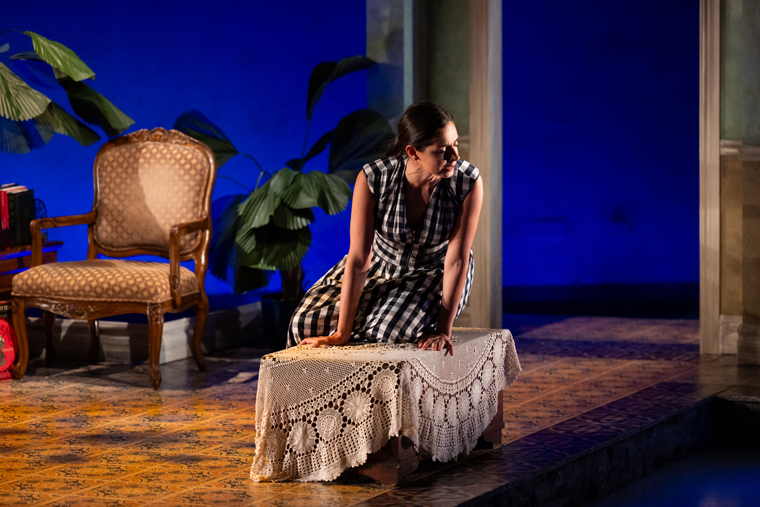
Stephanie Machado as Sofia in Miami New Drama's production of Nilo Cruz's “Two Sisters and a Piano.” (Photo by Morgan Sophia Photography)
At the beginning of Miami New Drama’s fine production of Nilo Cruz’s poetic, character-driven play, “Two Sisters and a Piano,” we hear the soft, sweet notes of the instrument. Then, suddenly, harsh sound effects suggesting prison cells slamming and chaos overtake the pleasant music. It’s a smartly symbolic start to a production of a vital play that addresses censorship as well as the transporting power and beauty of art.
Undoubtedly, with school districts banning books at an alarming rate, the time is right to stage a piece such as “Two Sisters and a Piano.” It is an unapologetic and stirring celebration of art, freedom, and human beings’ creative spirit as well as people’s resiliency.
The passionate production by Miami New Drama runs through Feb. 18 at the Colony Theatre in Miami Beach, the resident theater's space. The production lasts about two hours, including a 15-minute intermission. The production is in English with Spanish subtitles (a side note: the subtitles could be displayed more prominently).
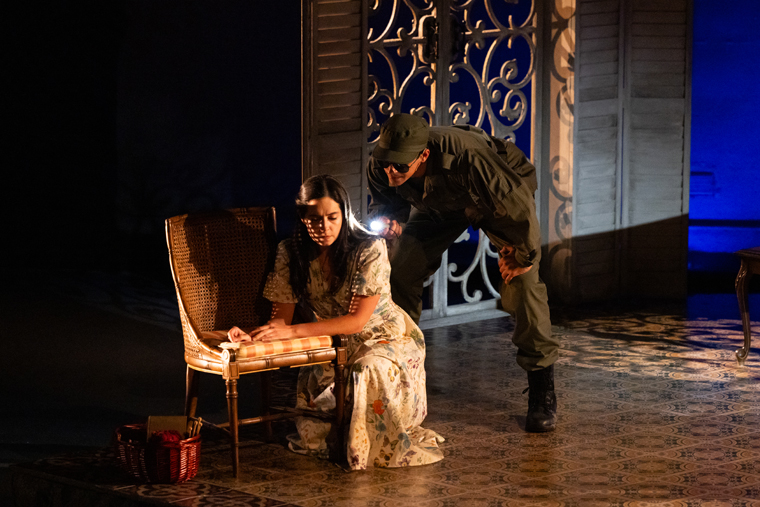
Stephanie Machado and Gabriell Salgado in Nilo Cruz's “Two Sisters and a Piano.” (Photo by Morgan Sophia Photography)
Last year at about this time, the company mounted an equally strong production of Cruz’s Pulitzer Prize-winning play, “Anna in the Tropics,” a sort of prelude to “Two Sisters and a Piano.” The former also centers on the ability of art, namely literature, to transport people.
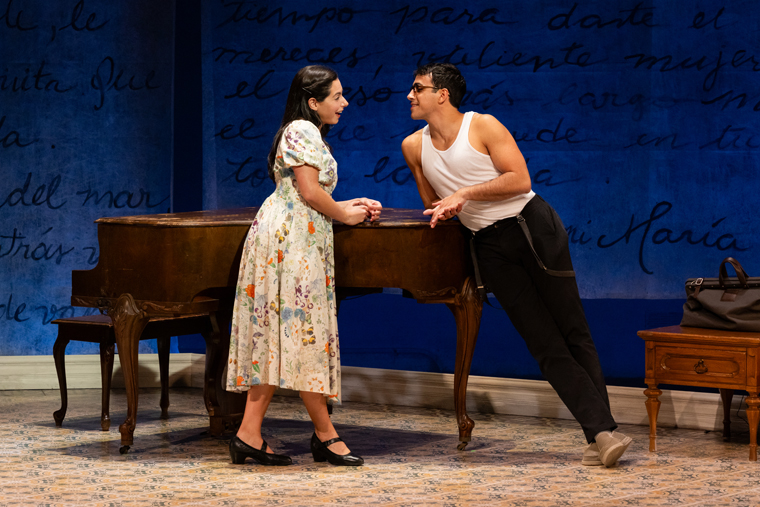
Stephanie Machado as Sofia and Gabriell Salgado as Victor Manuel in the Miami New Drama production of Nilo Cruz's “Two Sisters and a Piano.” (Photo by Morgan Sophia Photography)
One member of the “Tropics” cast has returned to appear in the bilingual theater company’s staging of “Two Sisters and a Piano.” Specifically, the much in-demand and talented young actor Gabriell Salgado, who portrayed the Lector in “Tropics,” embodies the roles of Victor Manuel and a militia guard in “Sisters.”
Salgado and his stellar castmates disappear into their roles. They deliver performances blessed with nuance, spontaneity, and authentic emotion.
As he did in “Tropics,“ Cruz sensitively directs this time around as well. Under his guidance, cast members honor the poetry of Cruz’s lyrical language, speaking and gesturing with deft expression. Also, Cruz paces the production well, while clearly contrasting tense scenes from more laid back moments and stressing the play’s humor and seriousness.
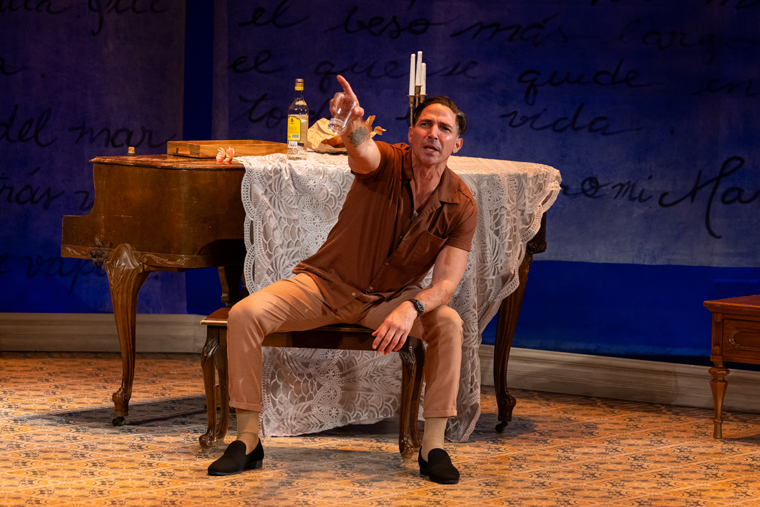
Maurice Compte as Lieutenant Portuondo in Nilo Cruz's “Two Sisters and a Piano.” (Photo by Morgan Sophia Photography)
In addition to Salgado, the cast includes Maurice Compte as Lieutenant Portuondo, Stephanie Machado as Sofia, and Thais Menendez as Maria Celia.
“Two Sisters and a Piano” takes place in 1991 in Havana, Cuba during the Pan American Games and during the collapse of the Soviet Union.
Amid these conditions, sisters Maria Celia, a romance novelist and Sofia, a pianist, find themselves under house arrest for an indefinite period of time. As the play opens, the siblings have just returned home from spending two years in prison for writing a manifesto demanding freedom.
As Maria Celia and her younger sister await changes for Cuba as well as to their own situation, a charismatic military officer tries to watch their every move. But while the officer, Lt. Portuondo, is charged with ensuring the sisters do not escape, he finds himself intrigued by Maria’s writings. While the sisters are not able to literally escape, they do so through their imagination by playing music and reading aloud Maria’s eloquent fiction and heartfelt letters to her husband.
Speaking of Maria’s spouse, while the play’s action takes place, he is in Europe trying to free Maria. And Lt. Portuondo alternates between being the siblings’ jailer and reading aloud Maria’s writings. In fact, throughout the piece, a power struggle plays out between Maria and the lieutenant. The conflict is a kind of cat-and-mouse game and it’s part of what drives the narrative. Meanwhile, the sisters have obtained a permit to tune their neglected piano. The tuner, Manuel, flirts with Sofia while fearing that if he continues to act on his feelings, he could land in trouble.
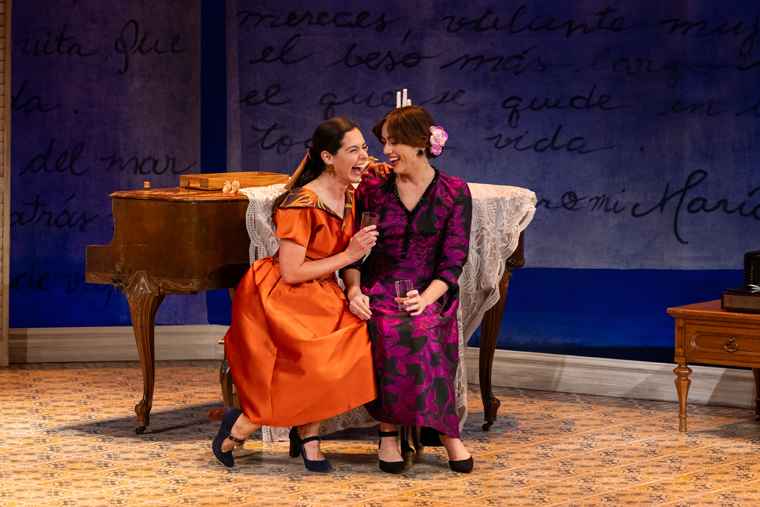
Stephanie Machado as Sofia, left, and Thais Menendez as Maria Celia in the Miami New Drama production of Nilo Cruz's “Two Sisters and a Piano” at the Colony Theatre, Miami Beach, through Sunday, Feb. 18. (Photo by Morgan Sophia Photography)
Throughout the production, palpable tension is apparent between Maria and the lieutenant as Menendez and Salgado, respectively, portray them. Throughout, we wonder, for instance, whether the officer is merely trying to trap her or is he genuinely drawn to the beauty of her work. Or is he just trying to seduce her?
Here, all of those possibilities exist. One thing’s for sure, though. You cannot easily take advantage of Menendez’s Maria Celia. She is too wary, wise, and worldly for that. She does not grow easily flustered when the lieutenant seems to insinuate something. Instead, the dark-haired and dark-eyed performer smiles or acts seductively; you sense that Maria is daring the officer to make his next move.
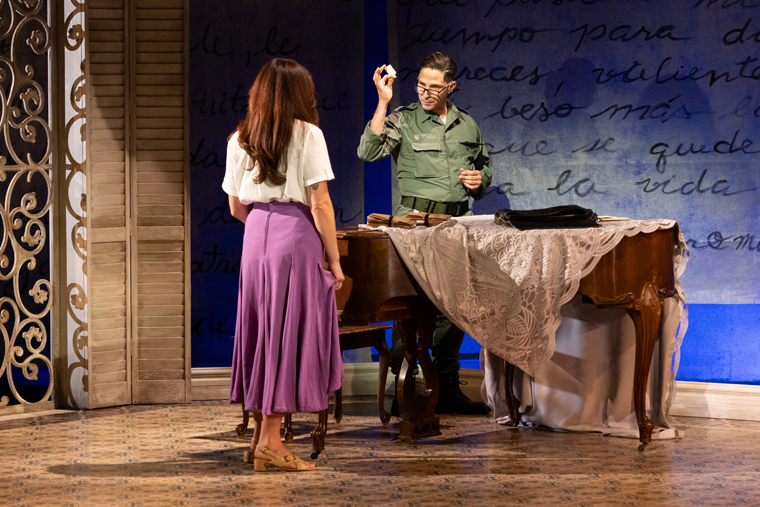
Maurice Compte as Lieutenant Portuondo confronts Thais Menendez as Maria Celia about her husband's letters. (Photo by Morgan Sophia Photography)
To her credit, Menendez projects an air of inner strength, calm, confidence, and shrewdness without making the character unlikable. True, there are times when you might expect Maria to sound and look fearful. Such times include the beginning of the play, as the siblings are beginning their sentence of house arrest. Two guards menacingly ask the siblings questions. All the while, though, Menendez’s Maria remains cool. Is she really that brave? Or is she just trying to appear that way so her younger sister won’t be as frightened?
Without a doubt, Menendez, in a multi-faceted performance, makes Maria a reassuring big sister. At times, she holds her younger sibling’s hand and touches her sister’s shoulder in a comforting manner. During at least one scene, the two hug in a tight embrace.
Menendez also shines while reading her character’s stories and letters. She does so longingly and with passion, relishing the words as she speaks them. And when the lieutenant reads aloud, Menedez’s Maria closes her eyes. She appears relaxed and in complete concentration.
In contrast to Menendez’s worldly Maria, Machado imbues Sofia with girlish excitement and naivete.
But as excited and dreamy as Machado’s Sofia appears in some scenes, in others she acts trapped and desperate.
Machado nicely combines desperation with anger, clearly directed at the lieutenant.
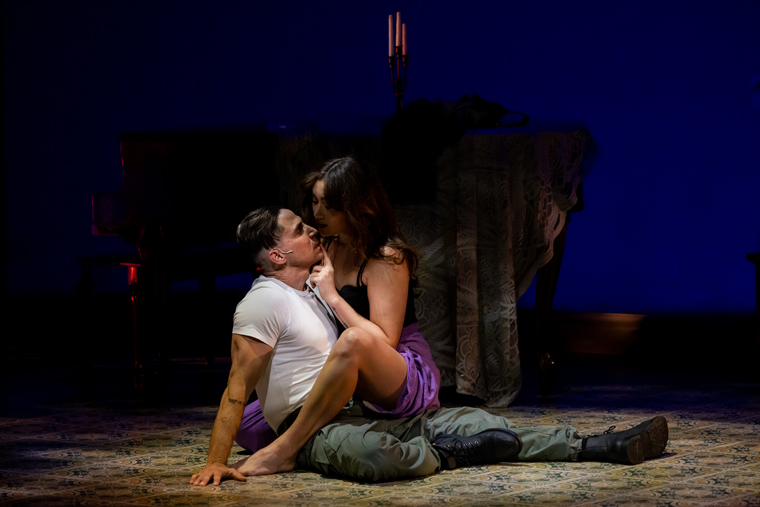
Maurice Compte as Lieutenant Portuondo and Thais Menendez as Maria Celia share stirring emotions in the Miami New Drama production of Nilo Cruz's “Two Sisters and a Piano.” (Photo by Morgan Sophia Photography)
Machado’s Sofia may be naïve and full of youthful excitement at times, but during other moments she is just as assertive as her older sister. Clearly, both are strong female characters.
The male characters are hardly wimps, either. In fact, Compte depicts an unpredictable lieutenant. One moment he is commanding and menacing, while the next he is expressively reading one of Maria’s writings in a soothing, soulful voice.
Compte’s lieutenant leans into Menendez’s Maria at times in an apparently genuine effort to connect with Maria. And he grows frustrated when he thinks he cannot connect with her. But we don’t know whether it’s all an act the officer is putting on to trap Maria into, perhaps, saying the wrong thing against the Cuban government.
You’d think, with a guard watching, the piano tuner would feel the need to be careful what he does and says in the sisters’ home. And while Salgado’s laid-back, carefree demeanor as the tuner Manuel is appropriate, you can’t help but wish that the performer would convey a bit more tension.
With that said, Salgado, as he usually does, brings an impressive naturalness to his character. His easy-going manner, charm, and easy smile/laugh combine to create a relatable and thoroughly likable young man. It’s a pleasure to experience the elegance and grace that Salgado displays every time he ascends a stage. In addition, as a military guard, the versatile Salgado is appropriately threatening.
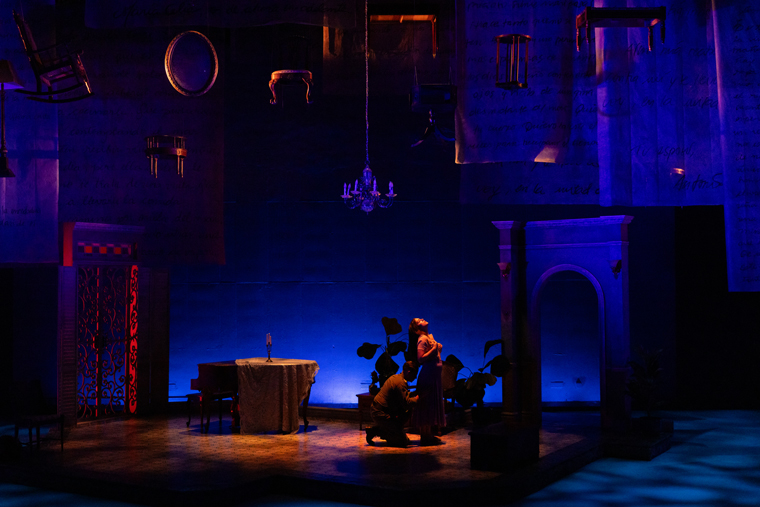
The set design speaks to the starkness of the play's surroundings in Nilo Cruz's “Two Sisters and a Piano” at Miami New Drama. (Photo by Morgan Sophia Photography)
While the talent is impressive onstage, the behind-the-scenes artists are also a major contribution to communicating Cruz’s directorial vision for his play.
Scenic designers Christopher and Justin Swader depict the sisters’ colonial home on a large platform. The set is sparse yet elegant, with items such as chairs, a tall, stately archway, a chandelier, an intricately patterned door and, of course, the brown-colored piano.
The set’s openness complies with the playwright and director’s wishes. Namely, in his script, he writes that “the set and lights should have a feeling of openness. They should not feel claustrophobic.” This makes sense; while the home is essentially the sisters’ prison during the play, the home’s builders never intended it to serve as a prison.
If you look up, you will see items hanging from the ceiling. They include furniture and writings by Maria Celia. The suspension of these items confiscated by the Cuban government creates an apt metaphor. Their status is “up in the air” during an uncertain time.
When music plays and characters read Maria’s writings, David Lander’s lighting is appropriately dimmed. This creates a romantic, elegant aura (the assistant lighting designer is Leo Urbina). Contrastingly, the lighting is appropriately bright and realistic at other times.
Michiko Kitayama Skinner designed the appealing elegant costumes, befitting the play’s elegance, while Salomon Lerner handled the sound design. In addition, Skinner composed the original music for the production. It is dramatic at times and more pleasant during others with musicians Lerner on piano and accordion, Lauren Aloia on piano, and Leon Grauer on tenor sax, soprano sax, and flute.
Cruz has said that the sensuality in Tennessee Williams’ work and the longing of Anton Chekhov’s characters have influenced his writing. It is evocative, vivid, poetic, and elegant. Cruz paints with words. Without a doubt, he is an artist worthy of celebration.
Miami New Drama’s production of Nilo Cruz’s poetic drama, “Two Sisters and a Piano” continues through Feb. 18 at the Colony Theatre, 1040 Lincoln Road in Miami Beach. Performances are at 8 p.m. Thursday through Saturday, and 3 p.m. Sunday. Tickets cost $46.50, $66.50, $69.50, $76.50, and $83.50. To buy tickets, and for more information, call (305) 674-1040 or go to www.miaminewdrama.org.




